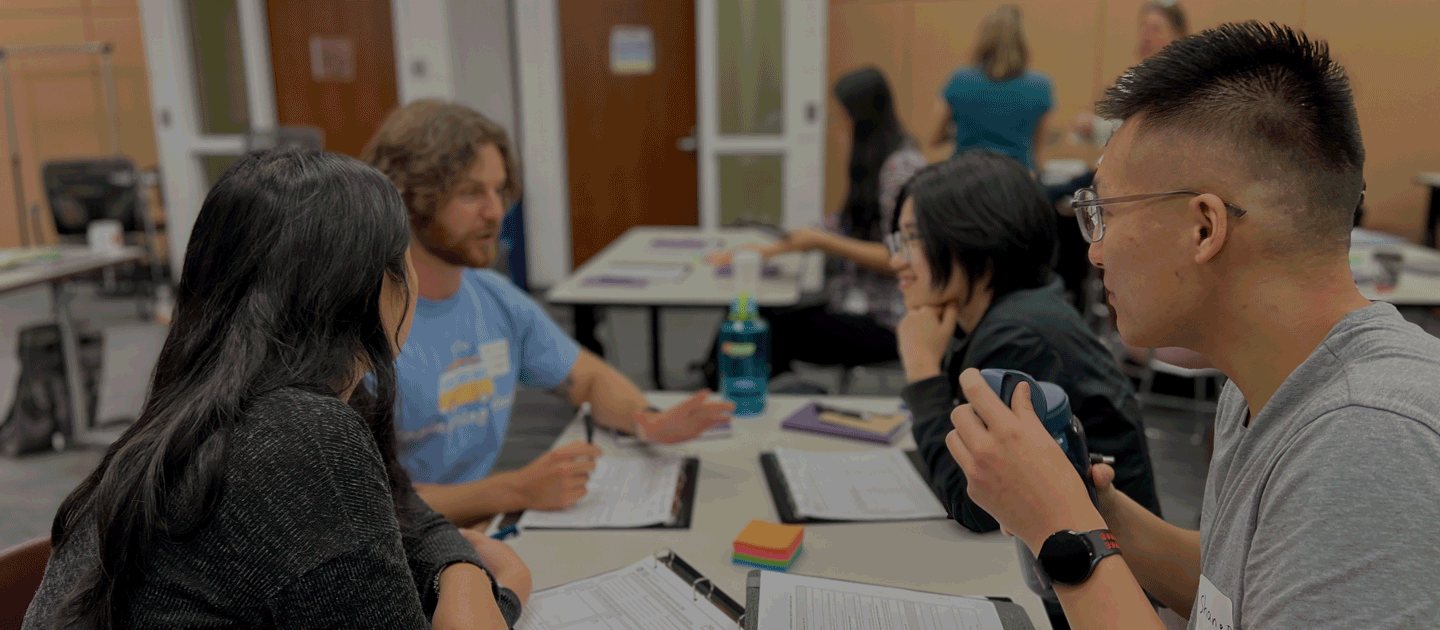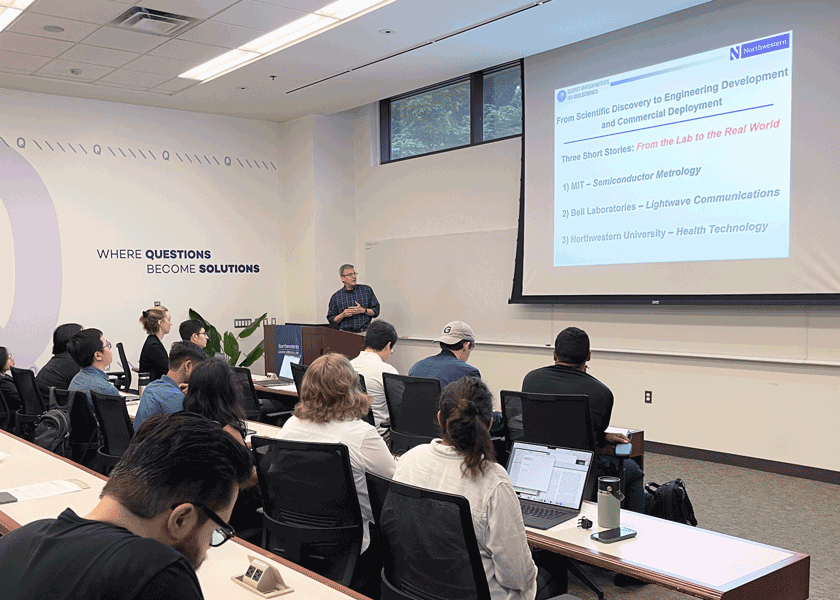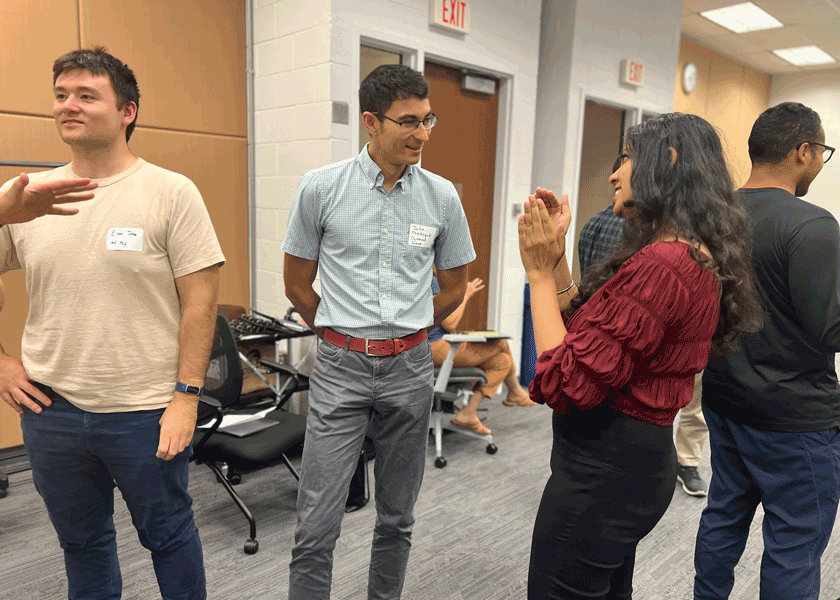Farley Center, Querrey InQbation Lab Host Summer Entrepreneurial Scientist Bootcamp
Northwestern PhD students explored entrepreneurship education opportunities and gained practical skills

Holding two Chicago Bulls tickets, Professor Eduardo Acuna stood before a room of nearly 30 PhD engineering students. He announced, "I want to give these away."
As the students' interest piqued, Acuna quickly pivoted to offering plane tickets and gift cards before finally upending a cup of loose change, scattering coins across the podium with a loud clatter.
As excited and confused chatter filled the room, Acuna concluded, "Now, imagine if all these were consolidated into one smart card?"
With that dramatic flourish, Acuna revealed that this scenario had been his pitch for a smart card startup — a venture that, unfortunately, had failed. His demonstration was the start of a key lesson for entrepreneurs about product-market fit and was the first of many “golden nuggets” shared during a two-day Farley-Q Summer Entrepreneurial Scientist Bootcamp hosted by Northwestern University's Farley Center for Entrepreneurship and Innovation and Querrey InQbation Lab.
Equipping future entrepreneur-scientists
The bootcamp — the first in a new series at Northwestern — was held Aug. 1-2 in the InQbation Lab and the Ford Engineering Design Center. The goal was to expose PhD students to entrepreneurship and innovation opportunities available at the University and to strengthen the connections within the University’s entrepreneurship and innovation ecosystem.
The bootcamp featured scientist-entrepreneur speakers and panelists as well as interactive workshops designed to give students a taste of entrepreneurship education and practical skills. During opening remarks, Lisa Dhar, associate vice president for Northwestern’s Innovation and New Ventures Office, emphasized the importance of empowering Northwestern students to explore the portfolio of educational opportunities at Northwestern and enable their entrepreneurial journey.
"This bootcamp represents a crucial step in nurturing the entrepreneurial spirit among our PhD students," Farley Center director Hayes Ferguson said. "By providing them with practical skills and networking opportunities, we're equipping them with ways to translate their research into impactful innovations.”
“Our goal is to inspire scientist entrepreneurs to think beyond the lab and consider how their work can address real-world challenges through entrepreneurship,” said Sonia Kim, executive director of the Querrey InQbation Lab.
"This bootcamp represents a crucial step in nurturing the entrepreneurial spirit among our PhD students."
Keynote speaker John Rogers, Louis Simpson and Kimberly Querrey Professor of Materials Science and Engineering, Biomedical Engineering, and Neurological Surgery at Northwestern University and cofounder of companies such as Sibel Health, Epicore Biosystems, Rhaeos, and Wearifi, shared his personal experiences transitioning from scientific discovery to commercial deployment.
Rogers highlighted the importance of finding product-market fit, understanding customer needs, and the rewards of converting science into societal value. As he recounted his experiences cofounding Active Impulse Systems based on his thesis work as an MIT PhD student, he highlighted the importance of industry engagement during his research. Drawing on his pioneering work in the field of bioelectronics, he advised students to remain open to new ideas and applications.

Bryce Meredig (PhD ‘12), adjunct professor of materials science and engineering and founding CEO of Citrine Informatics, a generative AI platform for materials and chemicals product development, offered insights from his journey from PhD student to Silicon Valley startup founder. Meredig stressed the importance of forming the right founding team, relentless focus on finding product-market fit, and understanding one's motivation for starting a company beyond financial gain.
A lunchtime panel discussion with Omar Farha, professor of chemistry and cofounder of NuMat; James Hedrick, chief product officer and cofounder of Azul 3D; and Yosi Kratish, research assistant professor of chemistry and cofounder of NylaNova — all scientist-entrepreneurs at different stages of tech development and commercialization — illuminated the range of paths to entrepreneurship and some of the pivotal decisions that enabled their startups.
Bridging academia and entrepreneurship
Entrepreneurship workshops led by Acuna, a professor at the Farley Center, provided students with practical knowledge on key aspects of launching a startup. Acuna emphasized the importance of solving real problems, developing desirable solutions, and creating self-sustaining businesses. He encouraged students to think creatively about potential markets for their technologies and to conduct extensive customer interviews.
The bootcamp also included a networking workshop led by Heather Barnes, adjunct lecturer at Kellogg School of Management and former director at the Griffin Museum of Science and Industry and also the Shedd Aquarium. Students learned principles of effective networking and prepared elevator pitches. The workshop aimed to help students overcome common networking fears and build meaningful connections. The students put their new skills into practice during an evening reception with partners and investors from the Northwestern ecosystem.
The two-day event concluded with a session where Ryan Jeffrey, Farley faculty member and general managing director at gener8tor, and Ferguson led bootcamp participants in dissecting a live pitch given by Yosi Kratish, as well as overviews from Arjan Quist, executive director of innovation management, Kim, Ferguson, and Mike Raab, executive director of The Garage at Northwestern, on the various Northwestern programs and resources available to student entrepreneurs.
Participating students found the bootcamp to be a valuable experience. Sarah Berman, a first-year PhD student in materials science, noted the unique perspective offered on technical entrepreneurship.
"It's an interesting thing to have this cool tech and then ask how you apply it," Berman said.
Abhiram Devata, another first-year PhD student, said, "I see myself doing some startup work in the next 5-10 years. I want to learn early so I have a running start when I eventually do it."
